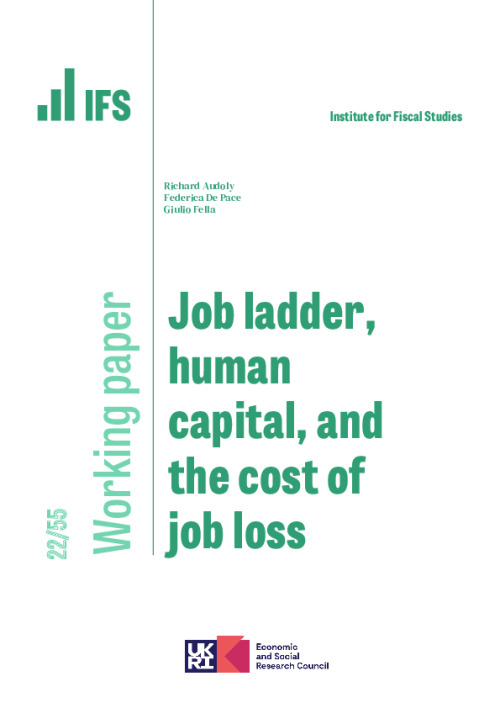Downloads

WP202255-Job-ladder-human-capital-and-the-cost-of-job-loss.pdf
PDF | 917.79 KB
High-tenure workers who lose their jobs experience a large and prolonged fall in wages and earnings. The aim of this paper is to understand and quantify the forces behind this empirical regularity. We propose a structural model of the labor market with heterogeneous firms, on-the-job search and accumulation of specific and general human capital. Jobs are destroyed at an endogenous rate due to idiosyncratic productivity shocks and the skills of workers depreciate during periods of non-employment. The model is estimated on German Social Security data. By jointly matching moments related to workers’ mobility and wages, the model can replicate the size and persistence of the losses in earnings and wages observed in the data. We find that the loss of a job with a more productive employer is the primary driver of the cumulative wage losses following displacement (about 50 percent), followed by the loss of firm-specific human capital (about 30 percent).
Authors

Research Associate New York Fed
Richard is a Research Associate and an Assistant Professor at the Norwegian School of Economics, focusing on labour, macro and search.
Federica De Pace
OECD

Research Associate Queen Mary, University of London
Giulio is a Research Associate of the IFS and a Professor in the School of Economics and Finance at Queen Mary University of London since 2017.
Working Paper details
- DOI
- 10.1920/wp.ifs.2022.5522
- Publisher
- Institute for Fiscal Studies
Suggested citation
R, Audoly and F, De Pace and G, Fella. (2022). Job ladder, human capital, and the cost of job loss. 22/55. London: Institute for Fiscal Studies. Available at: https://ifs.org.uk/publications/job-ladder-human-capital-and-cost-job-loss (accessed: 30 June 2024).
More from IFS
Understand this issue

If you can’t see it, you can’t be it: role models influence female junior doctors’ choice of medical specialty
24 April 2024

Sure Start achieved its aims, then we threw it away
15 April 2024

The NHS waiting list: when will it come down?
29 February 2024
Policy analysis

How do the last five years measure up on levelling up?
19 June 2024

The Conservatives and the Economy, 2010–24
3 June 2024

Universal credit: incomes, incentives and the remaining roll-out
11 June 2024
Academic research

The impact of labour demand shocks when occupational labour supplies are heterogeneous
28 June 2024

Labour market inequality and the changing life cycle profile of male and female wages
15 April 2024

Interpreting cohort profiles of lifecycle earnings volatility
15 April 2024